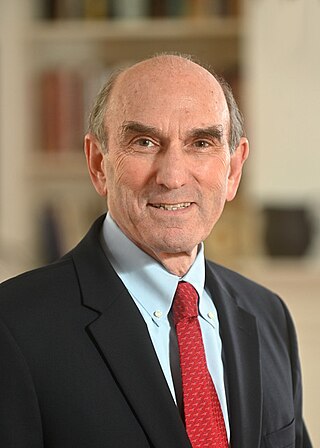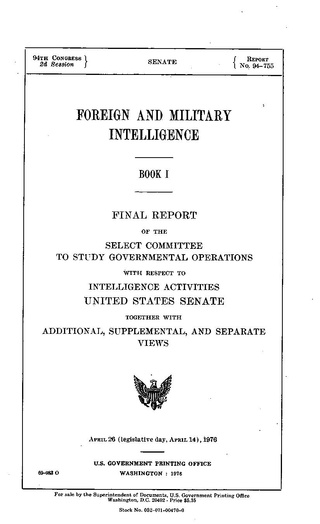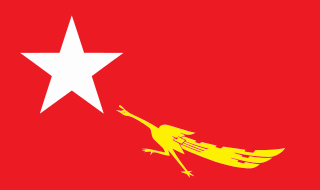Related Research Articles
Ibn al-Shaykh al-Libi was a Libyan national captured in Afghanistan in November 2001 after the fall of the Taliban; he was interrogated by American and Egyptian forces. The information he gave under torture to Egyptian authorities was cited by the George W. Bush Administration in the months preceding its 2003 invasion of Iraq as evidence of a connection between Saddam Hussein and al-Qaeda. That information was frequently repeated by members of the Bush Administration, although reports from both the Central Intelligence Agency (CIA) and the Defense Intelligence Agency (DIA) strongly questioned its credibility, suggesting that al-Libi was "intentionally misleading" interrogators.

Myanmar, officially the Republic of the Union of Myanmar, also known as Burma, is a country in Southeast Asia. It is the largest country by area in Mainland Southeast Asia and has a population of about 55 million. It is bordered by Bangladesh and India to its northwest, China to its northeast, Laos and Thailand to its east and southeast, and the Andaman Sea and the Bay of Bengal to its south and southwest. The country's capital city is Naypyidaw, and its largest city is Yangon.

Historically strained, Myanmar's foreign relations, particularly with Western nations, have improved since 2012. Relations became strained once more in 2017 with the Rohingya genocide and due to the 2021 Myanmar coup d'état. Myanmar has generally maintained warmer relations with near states and is a member of the Association of Southeast Asian Nations.

The Palestinian National Authority, commonly known as the Palestinian Authority and officially the State of Palestine, is the Fatah-controlled government body that exercises partial civil control over West Bank areas "A" and "B" as a consequence of the 1993–1995 Oslo Accords. The Palestinian Authority controlled the Gaza Strip prior to the Palestinian elections of 2006 and the subsequent Gaza conflict between the Fatah and Hamas parties, when it lost control to Hamas; the PA continues to claim the Gaza Strip, although Hamas exercises de facto control. Since January 2013, the Palestinian Authority has used the name "State of Palestine" on official documents, although the United Nations continues to recognize the Palestinian Liberation Organization (PLO) as the "representative of the Palestinian people".

Human Rights Watch (HRW) is an international non-governmental organization headquartered in New York City that conducts research and advocacy on human rights. The group pressures governments, policymakers, companies, and individual human rights abusers to denounce abuse and respect human rights, and often works on behalf of refugees, children, migrants, and political prisoners.

Elliott Abrams is an American politician and lawyer, who has served in foreign policy positions for presidents Ronald Reagan, George W. Bush, and Donald Trump. Abrams is considered to be a neoconservative. He is currently a senior fellow for Middle Eastern studies at the Council on Foreign Relations. He served as the U.S. Special Representative for Venezuela from 2019 to 2021 and as the U.S. Special Representative for Iran from 2020 to 2021.
Human rights in Cuba are under the scrutiny of human rights organizations, which accuse the Cuban government of committing systematic human rights abuses against the Cuban people, including arbitrary imprisonment and unfair trials. International human rights organizations such as Amnesty International and Human Rights Watch have drawn attention to the actions of the human rights movement and designated members of it as prisoners of conscience, such as Óscar Elías Biscet. In addition, the International Committee for Democracy in Cuba led by former statesmen Václav Havel of the Czech Republic, José María Aznar of Spain and Patricio Aylwin of Chile was created to support the Cuban dissident movement.

The Church Committee was a US Senate select committee in 1975 that investigated abuses by the Central Intelligence Agency (CIA), National Security Agency (NSA), Federal Bureau of Investigation (FBI), and the Internal Revenue Service (IRS). Chaired by Idaho Senator Frank Church (D-ID), the committee was part of a series of investigations into intelligence abuses in 1975, dubbed the "Year of Intelligence", including its House counterpart, the Pike Committee, and the presidential Rockefeller Commission. The committee's efforts led to the establishment of the permanent US Senate Select Committee on Intelligence.

Human rights in Myanmar under its military regime have long been regarded as among the worst in the world. In 2022, Freedom House rated Myanmar’s human rights at 9 out 100.

Stavros Lambrinidis is a Greek lawyer and politician who has been the ambassador of the European Union to the United States since March 2019. He was previously the European Union special representative for human rights from 2012 to 2019 and Minister for Foreign Affairs in Greece from June 2011 to November 2011.

Buddhism, specifically Theravāda Buddhism, is the state religion of Myanmar since 1961, and practiced by nearly 90% of the population. It is the most religious Buddhist country in terms of the proportion of monks in the population and proportion of income spent on religion. Adherents are most likely found among the dominant Bamar people, Shan, Rakhine, Mon, Karen, and Chinese who are well integrated into Burmese society. Monks, collectively known as the sangha (community), are venerated members of Burmese society. Among many ethnic groups in Myanmar, including the Bamar and Shan, Theravada Buddhism is practiced in conjunction with the worship of nats, which are spirits who can intercede in worldly affairs.
Khaled Abou el Fadl is the Omar and Azmeralda Alfi Distinguished Professor of Law at the UCLA School of Law where he has taught courses on International Human Rights, Islamic jurisprudence, National Security Law, Law and Terrorism, Islam and Human Rights, Political Asylum, and Political Crimes and Legal Systems. He is also the founder of the Usuli Institute, a non-profit public charity dedicated to research and education to promote humanistic interpretations of Islam, as well as the Chair of the Islamic Studies Program at the University of California, Los Angeles. He has lectured on and taught Islamic law in the United States and Europe in academic and non-academic environments since approximately 1990.

The state of human rights in the West Bank and Gaza Strip characterizes the State of Palestine as an authoritarian regime according to The Economist Democracy Index.
There is a history of persecution of Muslims in Myanmar that continues to the present day. Myanmar is a Buddhist majority country, with significant Christian and Muslim minorities. While Muslims served in the government of Prime Minister U Nu (1948–63), the situation changed with the 1962 Burmese coup d'état. While a few continued to serve, most Christians and Muslims were excluded from positions in the government and army. In 1982, the government introduced regulations that denied citizenship to anyone who could not prove Burmese ancestry from before 1823. This disenfranchised many Muslims in Myanmar, even though they had lived in Myanmar for several generations.

The Venezuela Information Office (VIO) was a Washington, D.C.-based lobbying agency that stated to be seeking to "present a more accurate view of the current process in Venezuela for the US public, build strategic allies for the Venezuelan people, and prevent the US from intervening in the democratic process in Venezuela." Created and financed by the government of Venezuela, VIO was registered with the United States Department of Justice under the Foreign Agents Registration Act. While operational, conservative and pro-opposition outlets have defined the agency of being a propaganda organization of the Venezuelan government and the Bolivarian Revolution.

William Anthony Schabas, OC is a Canadian academic specialising in international criminal and human rights law. He is professor of international law at Middlesex University in the United Kingdom, professor of international human law and human rights at Leiden University in the Netherlands, and an internationally respected expert on human rights law, genocide and the death penalty.
Aung Pwint is a Burmese journalist and documentary maker notable for his 1999 imprisonment by the State Peace and Development Council (SPDC), Burma's military government, on charges of fax-machine ownership and "sending news".

The 2011–2015 Myanmar political reforms were a series of political, economic and administrative reforms in Myanmar undertaken by the military-backed government. These reforms include the release of pro-democracy leader Aung San Suu Kyi from house arrest and subsequent dialogues with her, establishment of the National Human Rights Commission, general amnesties of more than 200 political prisoners, institution of new labour laws that allow labour unions and strikes, relaxation of press censorship, and regulations of currency practices. As a consequence of the reforms, ASEAN has approved Myanmar's bid for the chairmanship in 2014. United States Secretary of State Hillary Clinton visited Myanmar on 1 December 2011, to encourage further progress; it was the first visit by a Secretary of State in more than fifty years. United States President Barack Obama visited one year later, becoming the first US president to visit the country.
Burmese in Malaysia mostly comprise manual labourers and refugees. The 2014 Myanmar Census enumerated 303,996 Burmese individuals living in Malaysia. As of November 2014, there are around 139,200 Burmese refugees registered under UNHCR for which 50,620 are Chins, 40,070 are Rohingyas, 12,160 Panthays and 7,440 others are Rakhines/Arakaneses. However, the Malaysian government does not officially recognise all newly arrived refugees as it may encourage more to enter Malaysia as Malaysian officials noted they may become a threat to national security. Many of the new workers and refugees have frequently fall into the hand of human traffickers and have been killed by other criminals.

The Isaaq genocide, also known as the Hargeisa holocaust, was the systematic, state-sponsored genocide of Isaaq civilians between 1987 and 1989 by the Somali Democratic Republic, under the dictatorship of Siad Barre, during the Somaliland War of Independence. The number of civilian deaths in this massacre is estimated to be between 50,000 and 100,000, according to various sources, whilst local reports estimate the total civilian deaths to be upwards of 200,000 Isaaq civilians. The genocide also included the levelling and complete destruction of the second and third largest cities in the Somali Republic, Hargeisa and Burao, respectively, and had caused up to 500,000 Somalis of the region, primarily of the Isaaq clan, to flee their land and cross the border to Hartasheikh in Ethiopia as refugees in what was described as "one of the fastest and largest forced movements of people recorded in Africa", which resulted in the creation of the world's largest refugee camp then (1988), with another 400,000 being displaced. The scale of destruction led to Hargeisa being known as the 'Dresden of Africa'. The killings happened during the Somali Civil War and have been referred to as a "forgotten genocide".
References
- ↑ Mathieson, David; Watch (Organization), Human Rights (2009). Burma's Forgotten Prisoners. Human Rights Watch. p. 23. ISBN 978-1-56432-517-4.
- ↑ Burma Briefing: Without special title. ALTSEAN Burma. 2004. p. 80. ISBN 978-974-92614-6-0.
- ↑ Country Reports on Human Rights Practices: Report Submitted to the Committee on Foreign Affairs, U.S. House of Representatives and Committee on Foreign Relations, U.S. Senate by the Department of State in Accordance with Sections 116(d) and 502B(b) of the Foreign Assistance Act of 1961, as Amended. U.S. Government Printing Office. 2003. p. 663.